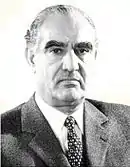1961 Iranian legislative election
Parliamentary elections were held in Iran in 1961, after the elections the previous year had been annulled by the Shah.[2] The result was a victory for the Party of Nationalists, which won majority of the seats.[2]
| |||||||||||||||||||
All 200 seats to the National Consultative Assembly | |||||||||||||||||||
|---|---|---|---|---|---|---|---|---|---|---|---|---|---|---|---|---|---|---|---|
| |||||||||||||||||||
 Composition of the Assembly following the election | |||||||||||||||||||
| |||||||||||||||||||
National Front candidates had been forcibly prevented from campaigning, such as Boroumand in Isfahan.[3] Among opposition, only Allahyar Saleh was able to win a seat in his native Kashan.[4]
Results
Zonis (1971) and Mehrdad (1980)
| Party | Seats | |
|---|---|---|
| Party of Nationalists | 69 | |
| People's Party | 64 | |
| Iran Party | 1 | |
| Independents | 31 | |
| Total | 165 | |
| Source: Zonis[5] and Mehrdad[6] | ||
Chehabi (1990)
| Party | % | |||
|---|---|---|---|---|
| Party of Nationalists | 45 | |||
| People's Party | 35 | |||
| Independents | 20 | |||
| Total | 100 | |||
| Source: Chehabi[7] | ||||
Nohlen et al. (2001)
| Party | Seats |
|---|---|
| Party of Nationalists | 75 |
| People's Party | 65 |
| Independents | 32 |
| Others | 28 |
| Total | 200 |
| Source: Nohlen et al.[2] | |
References
- "Chronology December 16, 1960–March 15, 1961". Middle East Journal. 15 (2): 187. Spring 1961. JSTOR 4323348.
- Nohlen, Dieter; Grotz, Florian; Hartmann, Christof (2001). "Iran". Elections in Asia: A Data Handbook. Vol. I. Oxford University Press. pp. 68, 73. ISBN 0-19-924958-X.
- Houchang E. Chehabi (1990). Iranian Politics and Religious Modernism: The Liberation Movement of Iran Under the Shah and Khomeini. I.B.Tauris. p. 152. ISBN 1850431981.
- Maziar, Behrooz (2000). Rebels With A Cause: The Failure of the Left in Iran. I.B.Tauris. p. 171. ISBN 1860646301.
- Zonis, Marvin (1971). Political Elite of Iran. Princeton University Press. p. 71. ISBN 9781400868803.
The Melliyun led with sixty-nine seats, the Mardom had sixty-four. But with neither party holding a majority, the votes of the thirty-two independents also elected would be decisive. And among the thirty-two was the name of Allahyar Saleh, the leader of the Iran party, the intellectual wing of the National Front.
- Mehrdad, Hormoz (1980). Political orientations and the style of intergroup leadership interactions: the case of Iranian political parties (PhD thesis). Ohio State University. p. 280. S2CID 148645507. osu1487090992443849.
- Houchang E. Chehabi (1990). Iranian Politics and Religious Modernism: The Liberation Movement of Iran Under the Shah and Khomeini. I.B.Tauris. p. 152. ISBN 1850431981.
When the election results were announced, the Melliyun party had obtained about 45 percent, and the Mardom party 35 percent of Majles seats, with the rest going to independents. In Teheran, pro-Amini independents had gained six out of fifteen seats, but Amini himself had not run. Nationalist candidates running individually, like Borumand in Isfahan, had been forcibly prevented from campaigning, with one exception: in Kashan, Saleh ran unopposed and was elected.
This article is issued from Wikipedia. The text is licensed under Creative Commons - Attribution - Sharealike. Additional terms may apply for the media files.

